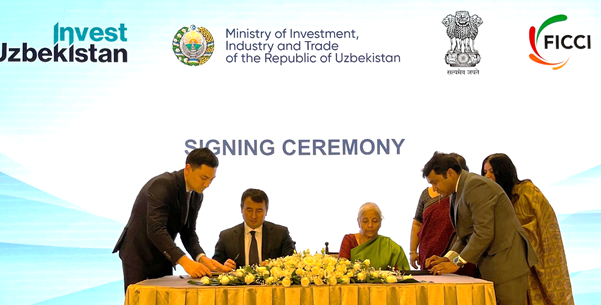INDIA-UZBEKISTAN BILATERAL INVESTMENT TREATY (BIT)

- 28 Sep 2024
In News:
India and Uzbekistan signed the Bilateral Investment Treaty (BIT) aimed at boosting the confidence of investors of both the countries.
Key Highlights:
- Investor Protections:
- Assured Protection: The BIT guarantees protection for investors from both countries, aligning with international standards.
- Minimum Standards: It establishes a minimum standard of treatment and non-discrimination for investors.
- Dispute Resolution: An independent arbitration forum will be available for dispute settlement.
- Investment Safeguards:
- Protection from Expropriation: The treaty safeguards investments from unjust expropriation.
- Transparency and Compensation: Provisions are included for transparency and compensation for losses incurred.
- Regulatory Balance: While protecting investors, the treaty maintains a balance with the state's right to regulate, ensuring adequate policy space for both countries.
Economic Context
- Shared Commitment: The BIT reflects the commitment of both nations to foster economic ties and create a resilient investment environment.
- Expected Outcomes: It is anticipated that the treaty will facilitate increased bilateral investments, benefiting businesses and economies in India and Uzbekistan.
- Current Investment Landscape: As of August 2024, Overseas Direct Investment (ODI) from India to Uzbekistan stands at $20 million, with Indian investments notable in sectors such as pharmaceuticals, amusement parks, automobile components, and hospitality.
India and Bilateral Investment Treaties
BITs are reciprocal agreements between two countries designed to promote and protect foreign private investments within each other's territories.
- Key Guarantees Established:
- National Treatment: Foreign investors are treated on par with domestic companies.
- Fair and Equitable Treatment: Investors receive treatment aligned with international law.
- Protection from Expropriation: Limits the ability of a country to seize foreign investments without appropriate compensation.
- Status of BITs in India
- Historical Context:
- Until 2015, India had signed BITs with 83 countries, with 74 currently in force. These agreements were based on the Indian Model BIT established in 1993.
- Revisions and Current Approach: In 2015, India revised its Model BIT text. Since then, India has:
- Signed new BITs/Investment Agreements with four countries.
- Entered negotiations with 37 countries/blocks for new agreements.
- Terminated older BITs with 77 countries, with only six remaining in force.
- Historical Context:
- Key Features of the Revised Model BIT
- Investor Protection:
- Provides robust protection for foreign investors in India and Indian investors abroad.
- Balances investor rights with government obligations.
- Investor Confidence:
- Enhances investor confidence by ensuring non-discriminatory treatment and a level playing field.
- Establishes an independent arbitration forum for dispute resolution.
- Investment Definition:
- Adopts an "enterprise"-based definition of investment to encompass various forms of investment.
- Dispute Settlement Provisions:
- Refined Investor-State Dispute Settlement (ISDS) provisions require investors to exhaust local remedies before seeking international arbitration.
- Limits arbitration tribunals to awarding monetary compensation only.
- Regulatory Authority Preservation:
- Excludes government procurement, taxation, subsidies, compulsory licenses, and national security from BIT coverage, ensuring the government retains regulatory authority.
- Investor Protection:
- Strategic Impact
- Preferred FDI Destination: The revised BIT aims to position India as a preferred destination for foreign direct investment (FDI).
- Protection of Outbound FDI: It also focuses on safeguarding outbound investments made by Indian entities.
